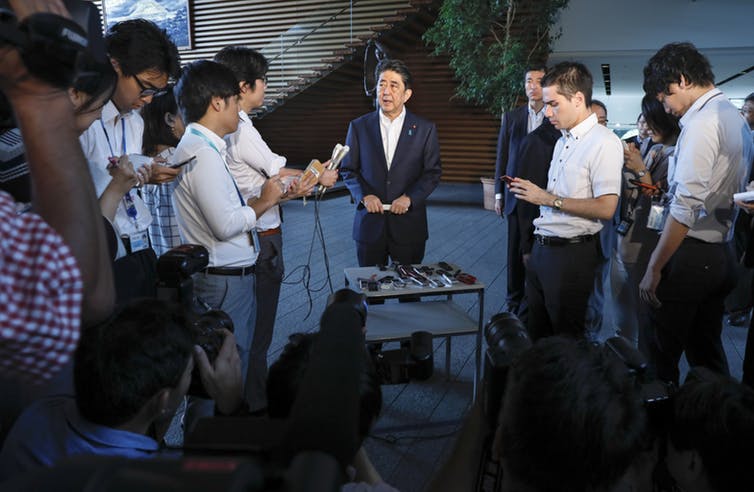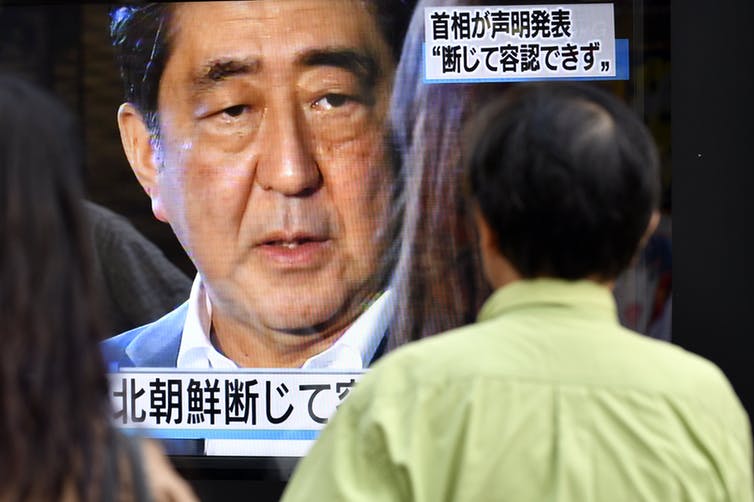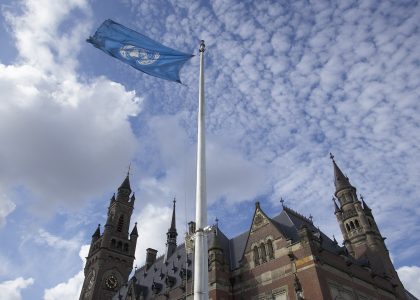As Japanese Prime Minister Shinzo Abe campaigns in a snap election, he looks set to enter into an unprecedented third term in office, and become Japan’s longest serving postwar prime minister. So who is he? What is the secret to his success? And why is he both so fervently supported and intensely hated?
Even before he became prime minister, Abe was notorious for his family links to a suspected war criminal, Kishi Nobusuke, and for his dubious connections with groups on Japan’s political far right.
Since his first stint in office (2006-7), he has been at the forefront of pushing for a hard line against North Korea, and championed the cause of abductees whom Pyongyang kidnapped from Japan. He has not shirked at visiting the controversially nationalistic Yasukuni Shrine, despite outrage from China and both Koreas. And above all, he has pushed for the modernisation and internationalisation of Japan’s military.
Under the buzzword “proactive peace”, this includes establishing overseas bases, training regional coastguards and reinterpreting the constitution to allow collective self-defence, meaning it could use military force to defend other allied countries if they were attacked. If he could stretch his political might just far enough, Abe would go further by becoming the first postwar leader to actually revise the constitution. This could once and for all dispel Japan’s longtime image as a “peace state”.

On the domestic front, Abe has been equally proactive. His flagship project, dubbed “Abenomics”, is pitched as a three-pronged strategy to lift Japan’s economy out of almost three “lost decades”. This centres on monetary easing, structural reform and fiscal stimulus. How well it has worked, though, remains the source of much debate.
What is clear is that Abe has justified a multitude of repressive, controversial and arguably unconstitutional moves and policies under the pretext of strong leadership. Under a new secrecy law, public servants could go to jail for up to 10 years if they reveal anything deemed counter to national security interests; a heavy-handed approach to the media has seen Japan plummet in press freedom rankings, and anti-terror conspiracy legislation even outlaws some forms of wild mushroom picking
But there is another side to Abe. Despite his stereotype, he is not simply a right-wing revisionist with a penchant for repression, militarism and nationalist chest beating. Abe is also a shrewd politician, and it’s his pragmatism that has really seen him sustain success.
Playing the game
First, he surrounded himself with a carefully selected and reshuffled pack of allies and counterparts. These he chose both to support his own agenda and appease his opponents. His fellow hardliner Tomomi Inada served as defence minister, while moderate Fumio Kishida became foreign minister. But Abe has no compunction about moving his ministers on when the time comes: he reluctantly but quickly axed Inada when she became embroiled in scandal, and reshuffled Kishida to a prominent new post to avoid alienating him.
Second, Abe’s timing has been both good and lucky. He waited until a vacuum appeared in his own party to resurface and assume the leadership. He was lucky in coinciding this with a fractured and discredited opposition, against which he quickly surged to power with a popular vote and political mandate rarely enjoyed in the postwar era.

Finally, Abe has managed to ride the global wave of populism – albeit in moderate form and with a conservative twist. In this vein, he is a champion to his supporters. Abe is the man that has shown leadership where others failed to, preceding and succeeding five consecutive premiers before him who had lasted little more than a year each in office.
He has also been quick to welcome Donald Trump’s leadership and has moved Japan ever closer to the US, joining Trump in continuing to push for more stick and less carrot to be used against Kim Jong-un’s North Korea. And while avoiding making relations with his nearest neighbours any worse, his strategists have continued to encircle and pressurise China. This takes concrete form by way of a Japan Self Defence Force base in Djibouti, Japan Coast Guard training exercises in the East and South China Seas, and the fortification of Okinawa.
But how will Abe be remembered? His fans will no doubt claim he fulfilled his promise to “take back Japan”. His opponents are still asking from where, and for whom it was “taken back”, if at all. Indeed, it’s hard to say whether or not Japan Inc. really is in better shape since Abe and his Liberal Democratic Party returned to power. But if the upcoming election proves anything, it will likely be that Team Abe’s dominance endures.
Ra Mason is a Lecturer in International Relations and Japanese Foreign Policy at the University of East Anglia.
This article was originally published on The Conversation. Read the original article.





